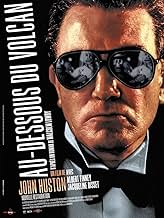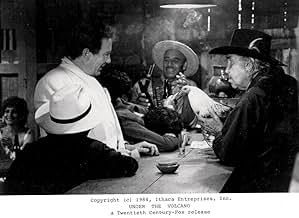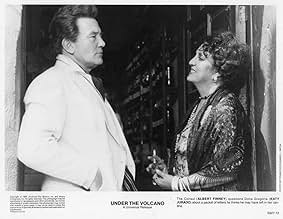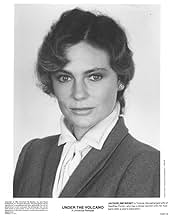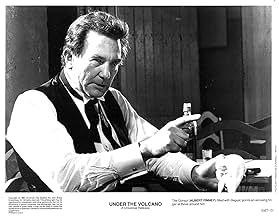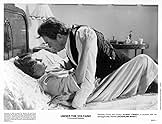AVALIAÇÃO DA IMDb
6,8/10
6,6 mil
SUA AVALIAÇÃO
Adicionar um enredo no seu idiomaA day in the life of a self-destructive British consul in Mexico on the eve of World War II.A day in the life of a self-destructive British consul in Mexico on the eve of World War II.A day in the life of a self-destructive British consul in Mexico on the eve of World War II.
- Direção
- Roteiristas
- Artistas
- Indicado a 2 Oscars
- 3 vitórias e 7 indicações no total
Ignacio López Tarso
- Dr. Vigil
- (as Ignacio Lopez Tarzo)
José René Ruiz
- Dwarf
- (as Rene Ruiz 'Tun-Tun')
Eleazar Garcia Jr.
- Chief of Gardens
- (as Eliazar García Jr.)
Salvador Sánchez
- Chief of Stockyards
- (as Salvador Sanchez)
Sergio Calderón
- Chief of Municipality
- (as Sergio Calderon)
Emilio Fernández
- Diosdado
- (as Emilio Fernandez)
Roberto Sosa
- Few Fleas
- (as Roberto Martinez Sosa)
- Direção
- Roteiristas
- Elenco e equipe completos
- Produção, bilheteria e muito mais no IMDbPro
Avaliações em destaque
Under The Volcano was originally a complex novel written by real-life alcoholic Malcolm Lowry. Film director John Huston also had a passing acquaintanceship with the bottle and a sensibility for grasping the dark, mystical side of Mexican culture. This all adds up to potent cinematic symbolic imagery underlining terrific performances from Finney, Bissett and Andrews. 8 stars
This is a fairly forgotten gem from the mid-80s, based on the classic and tragic novel of the same name. The film is also the legendary John Huston's third last movie as a director. Taking place in Mexico during the festival known as the Day of the Dead, the film also works against a backdrop of the early days of WWII, and explores the fragmented love triangle between a former British diplomat (Albert Finney), his estranged wife (Jacqueline Bisset), and his adventurous journalist brother (Anthony Andrews).
Under the Volcano starts out slowly, following the corpse-like wandering of retired diplomat Geoffrey Firmin as he explores the Day of the Dead and seeks out booze to feed his alcoholism. We're given various clues as to what has left him in such a sodden and rambling state, and we learn that his wife divorced him from abroad. Geoffrey proceeds to drink himself into oblivion, and into the fray enters his erstwhile wife Yvonne... testing the waters as it were for a possible reconciliation. Geoffrey's brother Hugh, recently returned from the Spanish civil war, is at a loss as to where he fits in with regards to their relationship, and also in regards to the world itself. The three decide to take a day trip out of town, with Yvonne and Hugh unsure of where Geoffrey's health and state of mind will literally lead them.
This film is a rambling, elegaic swansong to suntouched dreams fortified by alcohol. These three people try to outrun their demons and replace their mistakes with hollow new plans - Yvonne hopes to start her life anew, but Geoffrey's disgracefully drunken state makes him an unpredictable quantity to bank on, especially in regards to whether he can forgive her for the adultery that left him in such a state. Geoffrey tells a story at one point about a colonial named Blackstone, a man who turned native and disliked the puritans who tried to save him so much that he simply just disappeared into the wilderness. There's obviously something about this story that appeals to Geoffrey as he seems to identify with Blackstone so much that he later tells strangers that it's his name, and you can't help but feel that this is the only solution to the problems at hand that he can truly grasp at. Bubbling underneath the surface of the film all this time is a slowly building sense of doom highlighted by the coming of WWII, the ominous woodwind score, and the film's title itself. Geoffrey alludes to a horrific war story at several points, drawing comparisons with the 30s horror film Mad Love (referred to here as The Hands of Orlac) with his belief that "Some things you can't apologise for", and this quote echoes throughout the film whenever the main characters are forced to come face to face with each other's mistakes.
This won't be a film to everyone's taste, it starts out as something approaching a travel-drama but kind of mutates into outright tragedy in it's second half. At the core of Under the Volcano is a staggering performance from Albert Finney as the drunken diplomat. Finney was more than rightfully nominated for a Best Actor Academy Award for his realistic depiction of the life of a hopeless drunk... full of whimsy and cheer and rambling anecdotes, treading a fine line between absolute tankdom and lucidness, and tapping into all kinds of ambivalent emotions that would be far too challenging to a less complex and accomplished actor. Too often the drunk in film is shown as either a figure for comedy, fear or tragedy, but never are they shown as realistically as Finney's characterisation here. I could see shades of every pathetic and hilarious drunk I've ever met at a pub or a party in Under the Volcano's Geoffrey Firmin, and the film makes no compromises whatsoever in showing this for what it is. One of the best performances in film.
HIGHLIGHTS: There's nothing quite like a sinister Mexican dwarf grinning while he makes obscene gestures with his hands. I found this bit to be quite offputting and creepy.
Under the Volcano starts out slowly, following the corpse-like wandering of retired diplomat Geoffrey Firmin as he explores the Day of the Dead and seeks out booze to feed his alcoholism. We're given various clues as to what has left him in such a sodden and rambling state, and we learn that his wife divorced him from abroad. Geoffrey proceeds to drink himself into oblivion, and into the fray enters his erstwhile wife Yvonne... testing the waters as it were for a possible reconciliation. Geoffrey's brother Hugh, recently returned from the Spanish civil war, is at a loss as to where he fits in with regards to their relationship, and also in regards to the world itself. The three decide to take a day trip out of town, with Yvonne and Hugh unsure of where Geoffrey's health and state of mind will literally lead them.
This film is a rambling, elegaic swansong to suntouched dreams fortified by alcohol. These three people try to outrun their demons and replace their mistakes with hollow new plans - Yvonne hopes to start her life anew, but Geoffrey's disgracefully drunken state makes him an unpredictable quantity to bank on, especially in regards to whether he can forgive her for the adultery that left him in such a state. Geoffrey tells a story at one point about a colonial named Blackstone, a man who turned native and disliked the puritans who tried to save him so much that he simply just disappeared into the wilderness. There's obviously something about this story that appeals to Geoffrey as he seems to identify with Blackstone so much that he later tells strangers that it's his name, and you can't help but feel that this is the only solution to the problems at hand that he can truly grasp at. Bubbling underneath the surface of the film all this time is a slowly building sense of doom highlighted by the coming of WWII, the ominous woodwind score, and the film's title itself. Geoffrey alludes to a horrific war story at several points, drawing comparisons with the 30s horror film Mad Love (referred to here as The Hands of Orlac) with his belief that "Some things you can't apologise for", and this quote echoes throughout the film whenever the main characters are forced to come face to face with each other's mistakes.
This won't be a film to everyone's taste, it starts out as something approaching a travel-drama but kind of mutates into outright tragedy in it's second half. At the core of Under the Volcano is a staggering performance from Albert Finney as the drunken diplomat. Finney was more than rightfully nominated for a Best Actor Academy Award for his realistic depiction of the life of a hopeless drunk... full of whimsy and cheer and rambling anecdotes, treading a fine line between absolute tankdom and lucidness, and tapping into all kinds of ambivalent emotions that would be far too challenging to a less complex and accomplished actor. Too often the drunk in film is shown as either a figure for comedy, fear or tragedy, but never are they shown as realistically as Finney's characterisation here. I could see shades of every pathetic and hilarious drunk I've ever met at a pub or a party in Under the Volcano's Geoffrey Firmin, and the film makes no compromises whatsoever in showing this for what it is. One of the best performances in film.
HIGHLIGHTS: There's nothing quite like a sinister Mexican dwarf grinning while he makes obscene gestures with his hands. I found this bit to be quite offputting and creepy.
Albert Finney's performance of alcoholism is shattering and spot on. This movie should be required as adjunctive therapy in the field of alcoholism recovery. The feeling of hopelessness that permeates this movie makes it an experience the viewer should be advised about.
This movie packs a punch and Finney's performance is as exact and nuanced as is possible. His posture, his mental states, emotions, facial expressions, use of language, clothing, physicality are completely consistent with those of an alcoholic in an advanced stage of the disease.
Although it's a one-man movie, the other main players act exactly as real people do when dealing with alcoholics and portray the emotions and feelings that surround alcoholic situations.
This movie is definitely not a walk in the park.
This movie packs a punch and Finney's performance is as exact and nuanced as is possible. His posture, his mental states, emotions, facial expressions, use of language, clothing, physicality are completely consistent with those of an alcoholic in an advanced stage of the disease.
Although it's a one-man movie, the other main players act exactly as real people do when dealing with alcoholics and portray the emotions and feelings that surround alcoholic situations.
This movie is definitely not a walk in the park.
There are pointless arguments to be had as to whether Burton and Taylor in the main roles would have been better and wouldn't it have been good to see that Losey or, praise be, the Bunuel version get off the ground, but we have what we have. Almost fifty years on from when I read the deeply affecting book I cannot recall how faithful the telling is although I do retain a memory of it being more intense and foreboding than here. That volcano was not just a pretty picture but something like the forthcoming war that impinged upon the daily life. Nevertheless this is a very fine effort, Finney gives it his all and just about convinces, Bisset is pretty but less convincing and Huston has an eye for the Mexican setting, particularly the Day of the Dead celebrations and the final ghastly booze and debauchery sequence. But then, Huston himself knew more than a little about, not just drinking, but periods of drinking all the time, or as someone says here, 'drinking himself sober'.
It is the finale of this film that redeems any possible weakness of the story one may entertain in one's mind as one views this film. The ending is so overwhelming, I had to watch it again at once. I then rewatched parts of the film just to luxuriate in the brilliant acting of Albert Finney. This is truly a masterpiece. There have been some criticisms of Ms. Bisset's acting etc, but this is small potatoes compared to the sheer genius of this story and its' realization. The music in the opening credits sets the tone and immediately draws you into the film. You know something profound will happen in the film and to you as you watch this film. Highly Recommended.
Você sabia?
- CuriosidadesOn Albert Finney, director John Huston said, "I think it's the finest performance I have ever witnessed, let alone directed".
- Erros de gravaçãoThe story takes place in 1938, but the car driven by James Villiers that almost hits Albert Finney as he is lying in the road is an MG-TF, which was manufactured between 1953 and 1956.
- Citações
Geoffrey Firmin: How, unless you drink as I do, can you hope to understand the beauty of an old indian woman playing dominoes with a chicken?
- ConexõesFeatured in At the Movies: Conan the Destroyer/Top Secret!/Under the Volcano (1984)
Principais escolhas
Faça login para avaliar e ver a lista de recomendações personalizadas
- How long is Under the Volcano?Fornecido pela Alexa
Detalhes
- Data de lançamento
- Países de origem
- Centrais de atendimento oficiais
- Idiomas
- Também conhecido como
- Under the Volcano
- Locações de filme
- Acapantzingo, Morelos, México(Iglesia San Miguel Arcangel: opening scene of the Day of the Dead at dusk)
- Empresas de produção
- Consulte mais créditos da empresa na IMDbPro
Bilheteria
- Faturamento bruto nos EUA e Canadá
- US$ 2.556.800
- Fim de semana de estreia nos EUA e Canadá
- US$ 31.000
- 17 de jun. de 1984
- Faturamento bruto mundial
- US$ 2.556.800
- Tempo de duração1 hora 52 minutos
- Mixagem de som
- Proporção
- 1.85 : 1
Contribua para esta página
Sugerir uma alteração ou adicionar conteúdo ausente

Principal brecha
What is the Brazilian Portuguese language plot outline for À Sombra do Vulcão (1984)?
Responda

